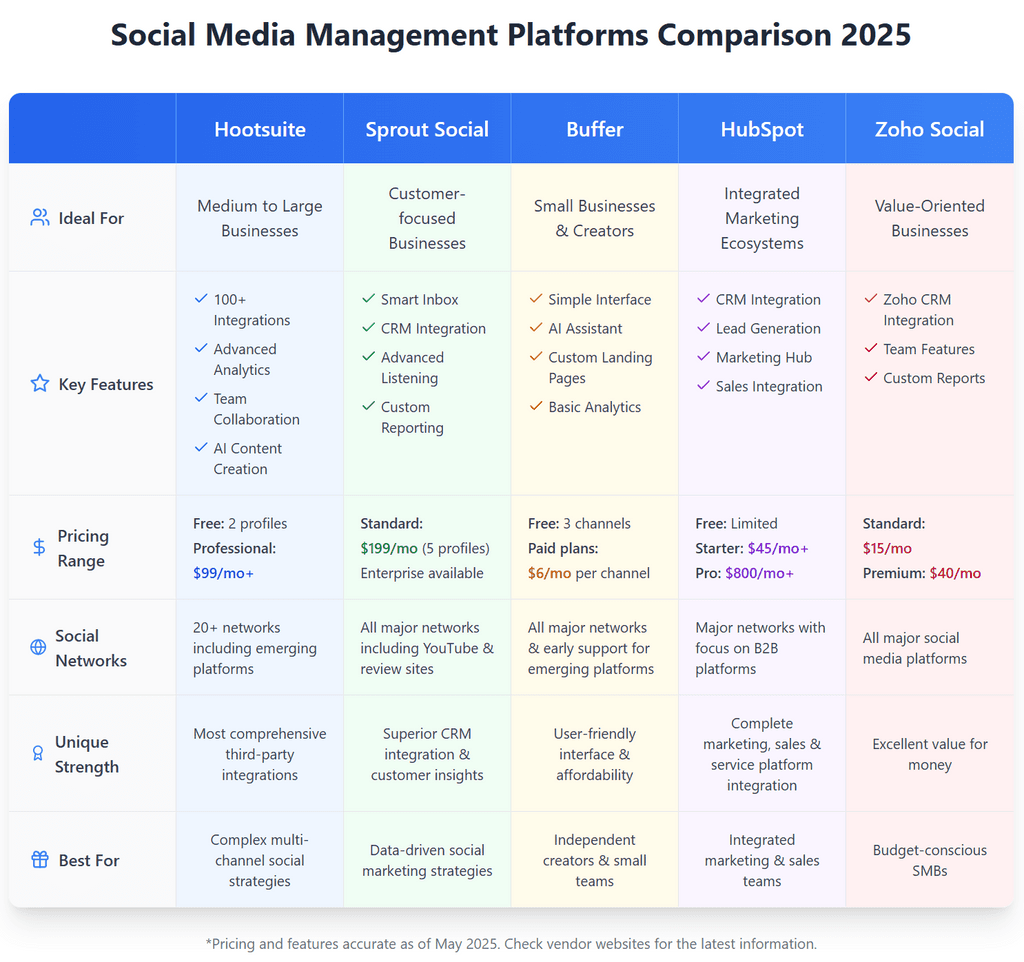With the average person using seven social media platforms per month, businesses need powerful tools to streamline their social media efforts, maintain consistency, and maximize engagement. This comprehensive guide explores the best social media management platforms in 2025, their key features, and how to choose the right one for your specific needs.
What Is a Social Media Management Platform?
A social media management platform is a secure, scalable tool that allows businesses to manage multiple social media accounts across departments and devices. These platforms provide essential functionality for:
- Scheduling and publishing content across multiple social networks
- Monitoring engagement and brand mentions
- Analyzing performance metrics and generating reports
- Collaborating with team members
- Managing customer communications and inquiries
- Creating and optimizing content with AI assistance
Rather than logging into each social network individually, social media management platforms provide a centralized dashboard where you can efficiently handle all aspects of your social media strategy from one place.
Why You Need a Social Media Management Platform
Managing social media without dedicated tools quickly becomes overwhelming, especially as your business grows. Here's why investing in a quality platform is crucial:
- Time Savings: Schedule content in advance and automate posting, freeing up valuable time for strategy and engagement.
- Consistent Posting: Maintain an active presence even when you're not online, posting at optimal times for engagement.
- Performance Tracking: Access comprehensive analytics to understand what content resonates with your audience.
- Team Collaboration: Enable multiple team members to contribute while maintaining brand consistency.
- Content Organization: Plan and visualize your content calendar across platforms in one place.
- Customer Service: Efficiently manage comments and messages from a unified inbox.

Top Social Media Management Platforms in 2025
1. Hootsuite
Hootsuite remains an industry leader in 2025, offering robust features for businesses of all sizes. The platform connects with over 20 social networks and includes over 100 integrations with other business applications.
Key Features:
- Comprehensive publishing and scheduling capabilities
- AI-powered content creation tools
- Advanced analytics and reporting
- Team collaboration features
- Social listening and monitoring
- Unified social inbox for engagement management
Best For: Medium to large businesses and enterprises with multiple social channels and team members. Hootsuite's flexible pricing plans make it accessible for growing businesses while offering the scalability needed for enterprise operations.
2. Sprout Social
Sprout Social excels at combining social media management with powerful CRM functionality, offering deep insights into customer interactions.
Key Features:
- Smart Inbox for centralized message management
- CRM integration for customer relationship tracking
- Comprehensive analytics and custom reporting
- Advanced listening tools for brand monitoring
- Team collaboration with approval workflows
- AI-powered content recommendations
Best For: Businesses focused on customer relationships and data-driven social strategies. Sprout Social is particularly valuable for companies that prioritize customer engagement and require detailed analytics to inform their strategy.
3. Buffer
Buffer stands out for its simplicity and user-friendly interface, making it perfect for smaller businesses and independent creators.
Key Features:
- Intuitive content scheduling and calendar view
- Quick analytics for performance tracking
- AI assistant for content creation
- Custom landing pages for social media profiles
- Affordable pricing structure
- Excellent for new and emerging social platforms
Best For: Small businesses, startups, and individual creators who need straightforward functionality without overwhelming complexity. Buffer's free plan for up to three channels makes it an excellent entry point for businesses just beginning their social media journey.
4. HubSpot
HubSpot offers social media management as part of its comprehensive marketing platform, making it ideal for businesses looking for integrated marketing solutions.
Key Features:
- Integration with HubSpot's CRM and marketing tools
- Content scheduling and publishing
- Social monitoring and engagement
- Detailed analytics and reporting
- Lead generation through social channels
- Content creation and optimization tools
Best For: Businesses already using or considering HubSpot's marketing ecosystem. The social media tools shine when used alongside HubSpot's other features, providing a unified approach to marketing, sales, and customer service.
5. Zoho Social
Zoho Social provides powerful social media management capabilities at competitive pricing, making enterprise-level features accessible to businesses of all sizes.
Key Features:
- Comprehensive publishing and scheduling tools
- Real-time monitoring and engagement
- Team collaboration features
- Detailed analytics and custom reports
- Integration with Zoho CRM and other Zoho apps
- Social listening capabilities
Best For: Businesses seeking value-oriented solutions, especially those already using other Zoho products. The platform offers a balanced combination of functionality and affordability that appeals to small and medium-sized businesses.
Choosing the Right Platform for Your Business
Selecting the perfect social media management platform depends on several factors:
1. Business Size and Budget
Smaller businesses with limited budgets might prefer platforms like Buffer or Zoho Social, while enterprises with complex needs may require Sprout Social or Hootsuite's enterprise plans.
2. Number of Social Networks
Consider which social platforms are important to your business. Some management tools excel with specific networks or have limitations with newer platforms.
3. Team Size and Collaboration Needs
If multiple team members will be using the platform, prioritize tools with robust collaboration features, role-based permissions, and approval workflows.
4. Analytics Requirements
For data-driven businesses, platforms with comprehensive analytics and custom reporting capabilities like Sprout Social or HubSpot may be more valuable.
5. Content Creation Needs
If you need assistance with content creation, look for platforms with AI writing capabilities, content libraries, and design integrations.
6. Budget and Scalability
Consider not just your current needs but how the platform can scale with your business as it grows. Many tools offer tiered pricing that allows you to upgrade as needed.
Implementing the 5-3-2 Rule for Social Media Success
Regardless of which platform you choose, following content strategy best practices will maximize your results. The 5-3-2 rule provides an excellent framework for maintaining engagement:
For every 10 posts:
- 5 should be content from other sources relevant to your audience
- 3 should be content created by you that's not promotional
- 2 should be personal, humanizing posts that showcase your brand personality
This balanced approach keeps your audience engaged without overwhelming them with promotional content.
Social Media Optimization (SMO): Beyond Basic Management
While social media management platforms help with the practical aspects of posting and engagement, true success comes from Social Media Optimization (SMO). This involves:
- Strategically enhancing your brand's presence across social platforms
- Creating shareable, engaging content tailored to each network
- Using analytics to continuously improve your approach
- Building authentic connections with your audience
- Aligning social efforts with broader marketing objectives
The best management platforms facilitate effective SMO through their analytics, content optimization suggestions, and engagement tools.
FAQs About Social Media Management Platforms
What is the best platform for social media management?
The "best" platform depends on your specific needs. Hootsuite, Sprout Social, and Buffer consistently rank among the top options in 2025, each excelling in different areas. For small businesses and individuals, Buffer offers simplicity and affordability. For larger organizations with complex needs, Hootsuite or Sprout Social provide more robust enterprise features. Businesses seeking an all-in-one marketing solution might find HubSpot ideal, while Zoho Social offers excellent value for budget-conscious organizations.
What is social media platform management?
Social media platform management involves the ongoing process of creating, scheduling, publishing, and analyzing content across multiple social networks. It includes monitoring engagement, responding to customer inquiries, tracking performance metrics, and maintaining a consistent brand presence online.
What are the 5 most popular social media platforms?
In 2025, the most popular social media platforms for business marketing are:
Each platform serves different audiences and content types, making a multi-platform strategy essential for most businesses.
What is the 5-5-5 rule on social media?
The 5-5-5 rule is an engagement strategy where you spend 5 minutes liking 5 posts and commenting on 5 posts each day. This simple practice helps build relationships, increase visibility, and boost engagement on your own content through reciprocal interaction.
Are social media managers worth it?
Yes, professional social media managers are valuable for businesses serious about their online presence. They bring expertise in content creation, platform best practices, analytics interpretation, and strategy development that can dramatically improve results compared to ad-hoc management.
What does SMO mean on social media?
SMO stands for Social Media Optimization, which is the process of using social media networks to grow and manage an organization's message and online presence. It involves optimizing content and engagement strategies to maximize reach, build community, and drive business results.
How much does it cost to hire a social media manager?
Social media management costs vary widely depending on experience level and services provided. In 2025, freelance social media managers typically charge $25-$100 per hour, while agencies may charge $1,000-$20,000 per month depending on the scope of work. Many small businesses opt for a combination of in-house management using tools like Buffer or Zoho Social, supplemented with occasional professional consulting.
How to do social media management for beginners?
For beginners, start with these steps:
- Choose 2-3 platforms most relevant to your audience
- Invest in a user-friendly management tool like Buffer
- Create a content calendar with a mix of content types
- Schedule posts consistently at optimal times
- Engage with your audience and respond promptly to comments
- Review analytics regularly to refine your approach
- Gradually expand to more platforms as you build confidence
What is the best free social media management tool?
Several platforms offer competitive free plans in 2025. Buffer allows management of up to three social channels for free, while Hootsuite provides limited functionality for up to two social profiles at no cost. These free options are ideal for individuals and small businesses just starting their social media journey.
Conclusion
The right social media management platform can transform your online presence from chaotic and time-consuming to strategic and efficient. By carefully evaluating your specific needs and testing different options (most platforms offer free trials), you can find the perfect tool to elevate your social media marketing in 2025 and beyond.
Remember that technology is only part of the equation—success ultimately comes from understanding your audience, creating valuable content, and building authentic connections across platforms. The best management tools simply make this process more efficient and effective.
